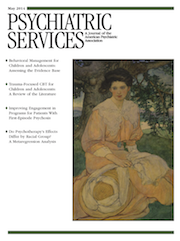Adding Evidence-Based Interventions to Assertive Community Treatment: A Feasibility Study
Abstract
Objective
This 24-month study, conducted in The Netherlands, examined the feasibility of enhancing the effectiveness of assertive community treatment (ACT) by adding evidence-based interventions.
Methods
A total of 159 patients were randomly assigned to two ACT teams, one providing standard ACT (N=85) and an ACT Plus team that also provided evidence-based interventions (N=74): psychoeducation, family interventions, individual placement and support, and cognitive-behavioral therapy. The interventions were conducted by psychologists and nurse practitioners working independently from the ACT team.
Results
Although most patients were judged eligible for each of the four interventions (range 65% to 89%), only 12 of the 74 patients (16%) successfully completed an intervention. Outcomes, such as use of inpatient care, for ACT Plus and standard ACT patients did not differ significantly.
Conclusions
Guidelines for the treatment of schizophrenia should consider the feasibility of delivering evidence-based interventions to difficult-to-engage patients.



